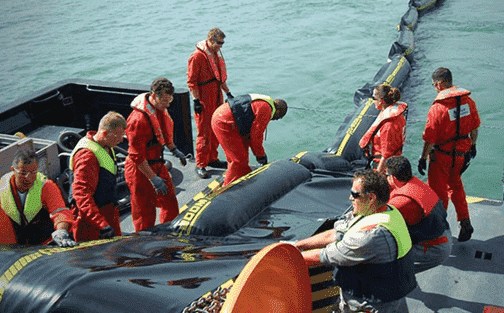COURSE OVERVIEW
HE1067 : Certified ISO 22000 Lead Auditor & Occupational Food Safety Inspector

OVERVIEW
| COURSE TITLE | : | HE1067 : Certified ISO 22000 Lead Auditor & Occupational Food Safety Inspector |
| COURSE DATE | : | Nov 09 - Nov 13 2025 |
| DURATION | : | 5 Days |
| INSTRUCTOR | : | Dr. Rawda El-Sheikh |
| VENUE | : | Al Khobar, KSA |
| COURSE FEE | : | $ 5500 |
| Register For Course Outline | ||
OTHER SCHEDULED DATES
Course Description
The ISO 22000:2005 provides industry with a standard for managing and reducing the risks to health resulting from operations across the food chain. The principal aim of this course is to help participants with a food industry background to assess the adequacy of the design, implementation and improvement of a food industry organization’s food safety management system against ISO 22000:2005 in accordance with ISO 19011.
The food safety management system auditor’s task is a complex one, with audit activity having to take into account many different levels of practices and procedures that support food safety, compliance to food safety legislation and other food safety requirements throughout the whole food chain. Whatever is actually in place within an organization, there is a need to recognize that food safety priorities must form the focus of the audit process.
This course is designed to provide food chain professionals with the skills and knowledge necessary to audit food safety management systems.
Although there is a clear, identifiable trend toward adopting a systematic approach to the regulation of food safety, there has been little commonality internationally amongst industry practices, with a great many different standards and guidance documents in use, including rating systems, point systems and a variety of management systems and management system guidelines. ISO 22000:2005 now provides the opportunity for achieving such commonality across all sectors of the food chain internationally.
The focus of this course is on evaluating the effectiveness of a FSMS through interpretation of ISO 22000:2005 in the context of the scope of an organization’s management arrangements, its legislative framework and the significant hazards of its operational processes.
The course is based on ISO 22000:2005 and ISO 19011, and audit activity of a food safety management system will require the auditor or audit team to recognise a wide variety of system components (i.e. a combination of a management system, risk assessment and control methodology and a variety of industry good practice and standard operating procedures that comprise the food safety management system).
This course is designed to provide participants with a comprehensive overview of occupational safety for food inspector. It covers the food safety; the associated hazardous areas; the food inspection process safety elements; the food inspection plan; the codes and standards; the legal requirements; the health and food validity certificates; the sanitation safety practices; the food industry personnel including inspector teams; the different aspects of the operation; the food inspection risk management and risk assessment; the hazardous analysis; the technical approach including data collecting, packing and labeling; and the safety and emergency response plan
link to course overview PDF
The food safety management system auditor’s task is a complex one, with audit activity having to take into account many different levels of practices and procedures that support food safety, compliance to food safety legislation and other food safety requirements throughout the whole food chain. Whatever is actually in place within an organization, there is a need to recognize that food safety priorities must form the focus of the audit process.
This course is designed to provide food chain professionals with the skills and knowledge necessary to audit food safety management systems.
Although there is a clear, identifiable trend toward adopting a systematic approach to the regulation of food safety, there has been little commonality internationally amongst industry practices, with a great many different standards and guidance documents in use, including rating systems, point systems and a variety of management systems and management system guidelines. ISO 22000:2005 now provides the opportunity for achieving such commonality across all sectors of the food chain internationally.
The focus of this course is on evaluating the effectiveness of a FSMS through interpretation of ISO 22000:2005 in the context of the scope of an organization’s management arrangements, its legislative framework and the significant hazards of its operational processes.
The course is based on ISO 22000:2005 and ISO 19011, and audit activity of a food safety management system will require the auditor or audit team to recognise a wide variety of system components (i.e. a combination of a management system, risk assessment and control methodology and a variety of industry good practice and standard operating procedures that comprise the food safety management system).
This course is designed to provide participants with a comprehensive overview of occupational safety for food inspector. It covers the food safety; the associated hazardous areas; the food inspection process safety elements; the food inspection plan; the codes and standards; the legal requirements; the health and food validity certificates; the sanitation safety practices; the food industry personnel including inspector teams; the different aspects of the operation; the food inspection risk management and risk assessment; the hazardous analysis; the technical approach including data collecting, packing and labeling; and the safety and emergency response plan
TRAINING METHODOLOGY
This interactive training course includes the following training methodologies:
LecturesWorkshops & Work Presentations
Case Studies & Practical Exercises
Videos, Software & Simulators
In an unlikely event, the course instructor may modify the above training methodology for technical reasons.
VIRTUAL TRAINING (IF APPLICABLE)
If this course is delivered online as a Virtual Training, the following limitations will be applicable:
| Certificates | : | Only soft copy certificates will be issued |
| Training Materials | : | Only soft copy materials will be issued |
| Training Methodology | : | 80% theory, 20% practical |
| Training Program | : | 4 hours per day, from 09:30 to 13:30 |
RELATED COURSES

HE0790 : Oil Spill Management & Response (IMO Certification)
- Date: Jan 05 - Jan 09 / 3 Days
- Location: Al Khobar, KSA
- Course Details Register

HE0749 : API-780: Security Risk Assessment Methodology for the Petroleum & Petrochemical Industries
- Date: Jan 05 - Jan 09 / 3 Days
- Location: Dubai, UAE
- Course Details Register

HE0400 : Fundamentals of Process Safety & Loss Prevention
- Date: Jan 05 - Jan 09 / 3 Days
- Location: Doha, Qatar
- Course Details Register

HE0851 : Certified Incident Investigator: Incident Investigation & Reporting (NFPA, OSHA, API, ISO & ANSI Standards)
- Date: Jan 05 - Jan 09 / 3 Days
- Location: Dubai, UAE
- Course Details Register
